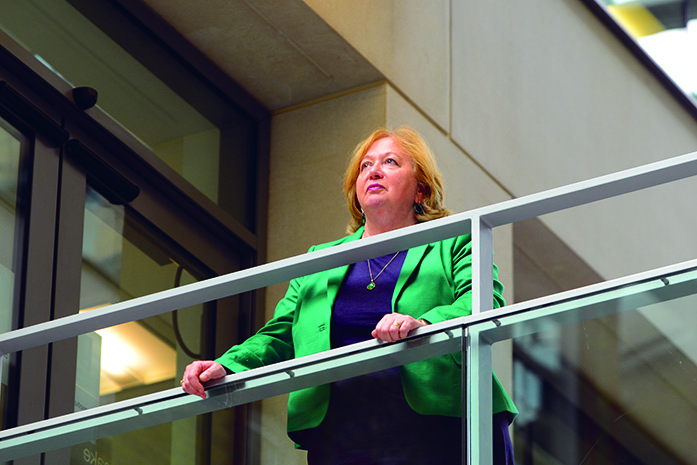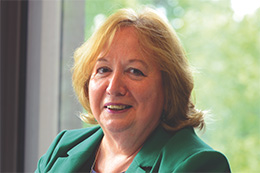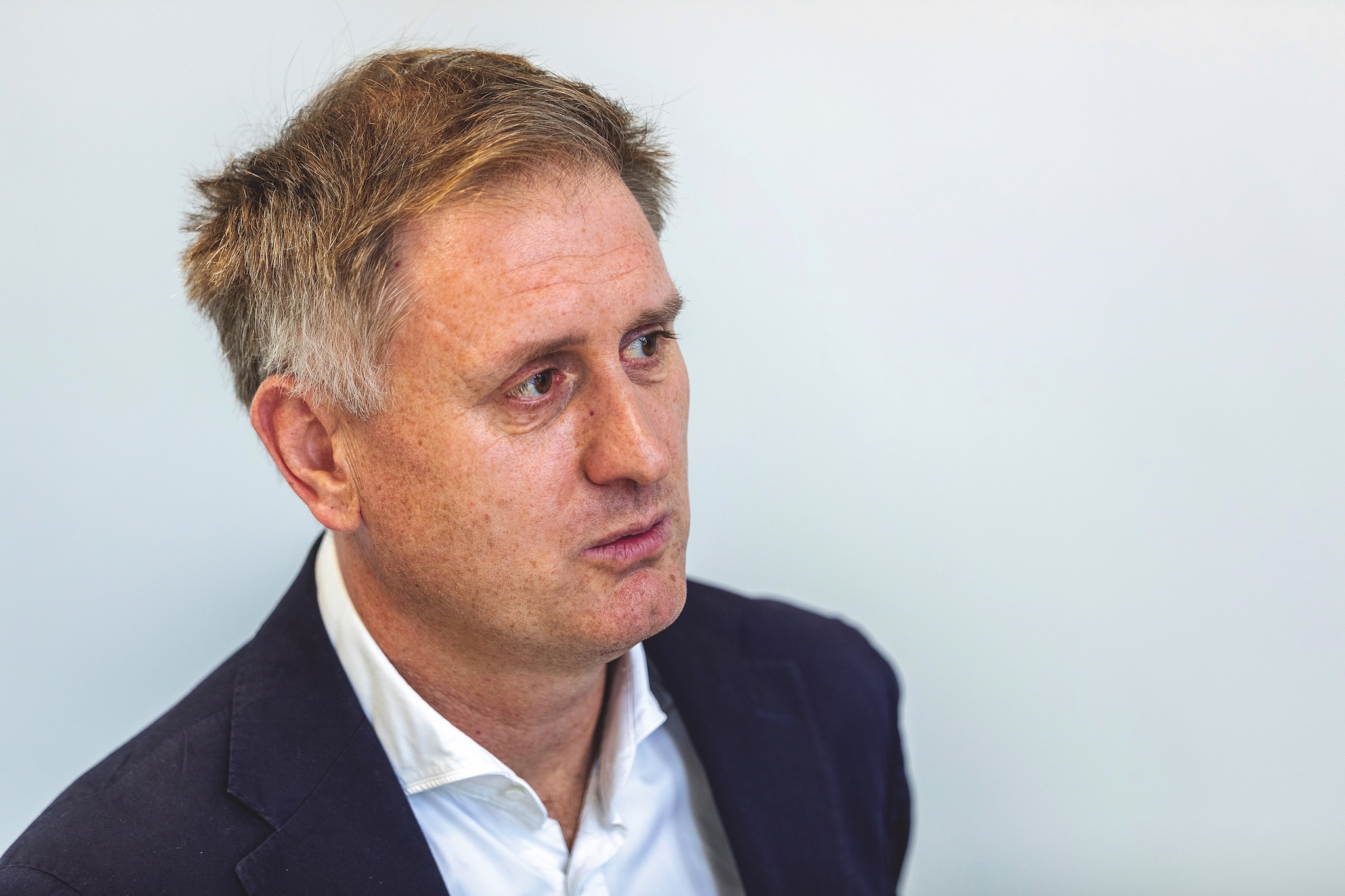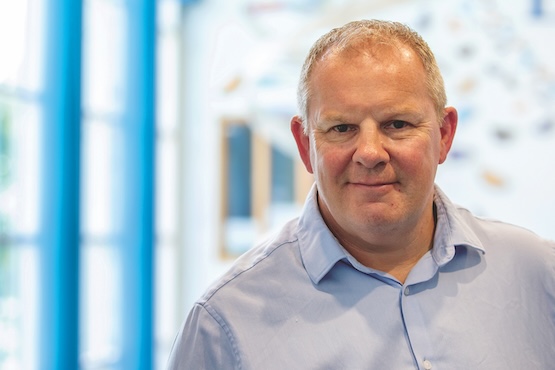Christina McAnea: We need good managers to keep the NHS running

Christina McAnea, elected as the first woman leader of UNISON in January, talks to MiP’s Matt Ross about the crucial role of managers in the NHS and UNISON, the future path for the union and her pragmatic approach to negotiations and politics.
“People say it takes a whole village to raise a child,” says Christina McAnea. “Well, it takes a whole team to cure a patient.” The NHS teams that provide and support patient care include staff from a huge range of disciplines, she explains, and no team can perform well without good leadership. “You need managers who can do the clinical supervision – but you also need managers for all the other functions that keep a huge organisation like the NHS running,” she says. “[If the NHS] “didn’t have good managers, then the staff that people see – the clinical staff, the patient-facing staff – wouldn’t be able to do their jobs.”
However, the work of senior leaders and non-clinical managers is rarely appreciated by the public. These crucial staff, McAnea says, “get a bad press, or they’re ignored. You seldom see anyone praising the role of HR, for example, in the NHS. Yet there’s so much that couldn’t happen if you didn’t have good HR people.” Senior executives in particular are often in a no-win situation: “When things are going well, people don’t automatically think that it’s because there’s a good team running that trust or that hospital,” she adds. “But when things go wrong, they’re the very first people who will get it in the neck.”
In part, McAnea believes, this problem is driven by the “narrative of ‘NHS equals doctors and nurses’ in the media”; on the rare occasions when managers do find themselves under public scrutiny, they’re often depicted as unfeeling bureaucrats or rapacious capitalists. So senior public servants can be left with a “feeling of always being on the wrong side”, she says.
She warns this can make healthcare jobs less attractive to skilled professionals – who have plenty of other options – causing real damage to NHS organisations. “If you’re an IT specialist or an HR manager or an accountant or a lawyer, you can transfer out of the NHS quite easily,” she says. “Organisations tell us that they do have turnover problems in these areas… Some of the highest turnover rates are among senior managers. And that’s not good for anybody.”
One team
McAnea has been making this case for a long time. As UNISON’s head of health five years ago, she launched the union’s NHS ‘One Team’ campaign – highlighting the crucial importance of non-clinical staff in providing healthcare services. The campaign is a “critical and integral part of everything that we do” within UNISON’s NHS operations, she says, promoting the message that behind the clinicians “there’s a whole team of people – including managers – who make it possible for them to do their jobs.”

One of McAnea’s core goals as general secretary is to develop the union’s presence and influence by representing staff at every level in key public services. “We see ourselves as a sectoral union, as opposed to a horizontal union,” she says. “So we’re not pitching just to the low-paid or to the higher-paid; we’re pitching to local government; to police; to the NHS and the care sector.”
MiP “incredibly valuable” to UNISON
Given this strategy, MiP itself – a joint venture with the FDA, the senior senior civil servants’ union – is “incredibly valuable” to UNISON, expanding the union’s offer up the management chain throughout the NHS and adult social care. And there are further benefits, as McAnea explains.
At the local level, “having managers who are committed to the union – even if it’s a separate bit like MiP – has to be helpful when you’re in negotiations,” she says. Talks on pay, conditions or organisational change are often more productive when the manager on the other side of the table is a fellow union member: “It’s not that they’ll cave in and give you what you want, but you’re dealing with people who see the value of trade unions,” she explains.
What’s more, the “expertise and experience” of MiP members helps strengthen UNISON’s positions. “When we’re trying to make an argument to government or to employers, having the voice of senior staff in that sector is really important,” she says. And when, engaging with NHS reform projects, the union works to “make change happen more effectively and more efficiently, or to try to influence the change that’s coming forward, having managers on your side in that process can only be helpful.”
Pragmatic politics
This focus on improving change programmes – rather than instinctively opposing them – is characteristic of McAnea’s pragmatic approach. “If there’s an evidence base to say that certain functions should change [to improve patient care] – services should be closed or opened; certain things should be centralised or split up – and it’s not being done purely to save money, we will work with employers and organisations,” she says. After all, NHS staff must constantly adapt to developments in medicine and technology: “I don’t think that anyone who works in the NHS would thank us for having a policy of blanket opposition to change.”
But while McAnea speaks softly, she retains her big stick: “Industrial action is always on the table,” she says. “I led the NHS strike in 2014 – the first we’d had in England in 25 years – so I’m no stranger to taking industrial action.” If the government were to revive austerity-era policies and “start coming after public sector pay and conditions again, then for a union like ours industrial action is always a possibility,” she warns.
McAnea is equally pragmatic on politics. “We’re affiliated to the Labour Party, and we will be working to try and get a Labour government returned,” she says – but she’s careful to keep a certain distance, noting that individual members can choose whether or not to affiliate. “My job is to be general secretary of a trade union; I’m not trying to bring the Labour Party into the union,” she adds. UNISON members don’t “want us to be constantly telling them how they should vote, or us to be constantly telling the Labour Party what they should be doing.” In the devolved governments, she notes, UNISON “recognises the political realities, and works with that”.
Asked about Sir Keir Starmer’s performance, McAnea acknowledges the difficulties he’s faced since being elected as Labour leader just a week after the first lockdown began. “You couldn’t imagine a more difficult time to become leader,” she says. “You’re trying to show how different you are from the current government, but at the same time you’ve got a national crisis and you can’t seem too oppositionalist.”
For McAnea, Labour’s electoral success is just as important as its adoption of UNISON positions: asked which she’d prioritise, she replies that “even if we were able to convince them to support every single policy that UNISON wanted, if they’re not in power it doesn’t really matter. You need a Labour government in power, and then we can continually try and influence them to do more of the things that we want.”
False narratives
If McAnea is wary of being too close to one party, she’s not shy of politics: her views may have developed since her teenage days in Glasgow’s Communist Party, but she slams the Tories’ record on public services and Covid-19. “If you don’t have well-resourced, well-funded and well-staffed public services, then you see the impact through this pandemic – or indeed any other crisis,” she says. “We’ll be doing everything we can to remind our members of the appalling mistakes that have been made by the Westminster government.”
She’s particularly irritated by the “false narrative” – popular among Tory MPs and some media commentators – that suggests that “if the government funds the public sector, it’s at the expense of the private sector: actually, both utterly depend on each other.” Private companies, she adds, need “a workforce that’s cared for and can access good public services”.
This, in turn, demands public investment – and McAnea rejects the idea that government lacks the resources required. “Austerity is a political choice,” she says, noting that when the pandemic arrived “the government was able to find money to deal with the crisis”. Sensible tax reforms, she argues, could help broaden the tax base: “There’s something fundamentally wrong in a system where we tax income, but we don’t tax wealth,” she says, and we need a “much better system in terms of taxation of the big corporate organisations, which make huge profits in this country but are able to avoid paying taxes”.
On the politics of the pandemic, UNISON has opposed mandatory vaccination for health and care workers: how would McAnea justify this to staff who find themselves sharing spaces with the unvaccinated? “I completely understand,” she says. “I wouldn’t want to sit with people who aren’t vaccinated either.”
The explanation for UNISON’s position is – again – a pragmatic one. “I don’t think making it mandatory is the way to [maximise take-up]. I think it’s counter-productive,” she says, arguing that exerting pressure just increases “people’s wariness and suspicion of the vaccine”.
Expanding membership and influence
Looking ahead, McAnea is keen to expand UNISON’s presence in social care – a sector that is “completely undervalued, and has no organisational structure in a national sense”, she says. “There’s no minimum standards for pay and conditions; no minimum standards for training and development for staff.” In healthcare, she notes, there are “very well-established partnership arrangements” through which employers, unions and the government can debate policies and budgets; in social care, those forums simply don’t exist.
A key player in the Future Social Care Coalition, McAnea backs the creation of a ‘national care service’ – though she’s flexible about the form it would take, arguing only that government should “focus on what you want from a workforce in the care service, and build out from that.” She adds: “Despite many promises, the government clearly has no plan to reform social care. All we’ve seen so far is an unfair hike in national insurance contributions.”
Although social care is a very difficult sector to organise in – “we don’t have a lot of recognition, particularly in the private and voluntary sectors,” she says – its whole workforce could really benefit from stronger union representation – and the sector would fit neatly alongside UNISON’s existing strongholds in healthcare and local government.
“There’s very little being said about, and support given to, managers in the care service,” says McAnea. MiP’s offer, she believes, will enable UNISON to expand union membership and its own influence in this crucial yet under-developed field of public services.
Indeed, McAnea has been impressed with the MiP model, under which UNISON and the FDA union launched a spin-off union for senior staff in 2005, and is interested in extending it to other sectors. “Local government and education are two areas where I think it would be worth exploring whether this is a model that could work,” she says, “because I’m conscious that we probably don’t have the penetration into the senior staff in those sectors that ideally we would like.”
In the NHS, MiP has enabled the union to “give a voice and an identity to such an important group of managers”, McAnea says. And by extending UNISON’s offer up the management chain, MiP means UNISON can say that “we as a union represent everyone – from the cleaners and porters, right up to the very senior staff in the NHS. I think gives us both a really strong voice, and credibility as the voice of the NHS,” she concludes. “MiP is one of our success stories.”
Related News
-

“Showing kindness and trust creates a virtuous circle – people respond well to that”
As chief executive of Suffolk and North East Essex, one of England’s most highly rated integrated care boards, Ed Garratt has pioneered a radically different approach to leadership – one based around kindness, trust and putting down deep roots in local communities. He talks to Healthcare Manager’s Matt Ross.
-

We need to give managers reasons to join the profession — not risks to avoid
Steve McManus’s work developing the leaders and managers the NHS needs for the 21st century has caught the eye of national leaders. The Royal Berkshire trust chief executive talks to Matt Ross about transforming services, developing leaders and the right way to regulate the management profession.
-

Interview: Dr Phil Hammond, doctor, comedian, health campaigner
Doctor, comedian, broadcaster, writer, health campaigner and politician manqué, Dr Phil Hammond is now drawing up a manifesto to rescue the NHS and boost the nation’s health. On the eve of a watershed general election for the UK, he spoke to Healthcare Manager’s Matt Ross.